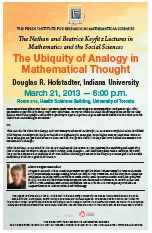|


|
The Ubiquity of Analogy in Mathematical
Thought
Mathematicians generally like to present their work in the
wraps of extreme rigor and pure logic. This professional posture
is in some ways very admirable. However, where do their ideas
really come from? Might mathematicians be cut from a different
cloth than ordinary humans, or could that be the case at least
temporarily, whenever they do their professional work? Could
it be that mathematicians, just before sitting down to do
their work, don blur-suppression helmets or anti-intuition
caps, in somewhat the same way passengers in cars fasten their
seatbelts? Do they then strictly follow the straight-and-narrow
pathways of pure, rigorous, logical axiomatic deduction in
order to reach their often astonishing conclusions?
No.
This talk will be about how deeply and universally mathematical
thought at all levels of sophistication is riddled with impure,
nonrigorous, illogical intuitions originating in analogies,
often highly unconscious ones. Some of these analogies are
good and some of them are bad, but good or bad, it is they
that lurk behind the scenes of all mathematical thought. And
far from being a disappointment, it is a source of joy to
recognize and savor the swarm of analogies that lurk behind
the scenes.
What is curious, to my mind, is that so few mathematicians
seem to take pleasure in examining and exploring this crucial
and wonderful aspect of their minds, their thoughts, and their
deep discoveries. Perhaps, however, they can be stimulated
to examine their own hidden thinking processes if the ubiquity
of analogies can be made sufficiently vivid as to grab their
interest. So in this talk, I will do my best to provoke mathematicians.
At the same time, I will try equally hard to convey to non-mathematicians
the sheer joy of mathematical thinking, of mathematical invention,
of mathematical discovery, of mathematical revelation.
To convey this intense type of joy, I will conclude the
talk with some highly personal tales of analogical invention/discovery
in mathematics, because I still recall the profound and heady
exhilaration they gave me over 50 years ago so vividly that
it all might as well have happened just yesterday.
|
Douglas Richard Hofstadter is an American professor of cognitive
science whose research focuses on the sense of "I",consciousness,
analogy-making, artistic creation, literary translation, and
discovery in mathematics and physics. He is best known for his
book Gödel, Escher, Bach: an Eternal Golden Braid, first
published in 1979. It won both the Pulitzer Prize for general
non-fiction and a National Book Award (at that time called The
American Book Award) for Science. His 2007 book I Am a Strange
Loop won the Los Angeles Times Book Prize for Science and Technology. |